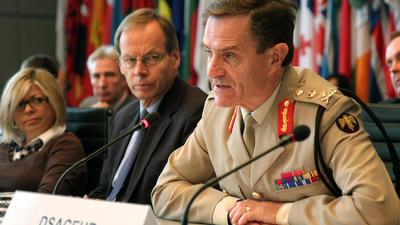-
Our work
-
Fields of work
- Arms control
- Border management
- Combating trafficking in human beings
- Conflict prevention and resolution
- Countering terrorism
- Cyber/ICT Security
- Democratization
- Economic activities
- Education
- Elections
- Environmental activities
- Gender equality
- Good governance
- Human rights
- Media freedom and development
- Migration
- National minority issues
- Policing
- Reform and co-operation in the security sector
- Roma and Sinti
- Rule of law
- Tolerance and non-discrimination
- Youth
- Field operations
- Projects
-
Meetings and conferences
- Summit meetings
- Review Conferences
- Ministerial Council meetings
- Plenary meetings of the Permanent Council
- Plenary Meetings of the Forum for Security Co-operation
- Security Review Conferences
- Annual Implementation Assessment Meetings
- Economic and Environmental Forum
- Economic and Environmental Dimension Implementation Meetings
- Human rights meetings
- Media conferences
- Cyber/ICT security conferences
- Conference of the Alliance against Trafficking in Persons
- Gender equality conferences
- Annual OSCE Mediterranean conferences
- Annual OSCE Asian conferences
- Partnerships
-
Fields of work
-
Countries
- All
-
Participating States
- Albania
- Andorra
- Armenia
- Austria
- Azerbaijan
- Belgium
- Belarus
- Bosnia and Herzegovina
- Bulgaria
- Canada
- Croatia
- Cyprus
- Czechia
- Denmark
- Estonia
- Finland – OSCE Chairpersonship 2025
- France
- Georgia
- Germany
- Greece
- Holy See
- Hungary
- Iceland
- Ireland
- Italy
- Kazakhstan
- Kyrgyzstan
- Latvia
- Liechtenstein
- Lithuania
- Luxembourg
- Malta
- Moldova
- Monaco
- Mongolia
- Montenegro
- The Netherlands
- North Macedonia
- Norway
- Poland
- Portugal
- Romania
- Russian Federation
- San Marino
- Serbia
- Slovakia
- Slovenia
- Spain
- Sweden
- Switzerland
- Tajikistan
- Türkiye
- Turkmenistan
- Ukraine
- United Kingdom
- United States of America
- Uzbekistan
- Asian Partners for Co-operation
- Mediterranean Partners for Co-operation
-
Structures and institutions
- Chairpersonship
-
Secretariat
- Secretary General
- Office of the Secretary General
- Conflict Prevention Centre
- Transnational Threats Department
- Office of the Special Representative and Co-ordinator for Combating Trafficking in Human Beings
- Office of the Co-ordinator of OSCE Economic and Environmental Activities
- Gender Issues Programme
- Opportunities for Youth
- Department of Human Resources
- Department of Management and Finance
- Office of Internal Oversight
- Documentation Centre in Prague
- Institutions
-
Field operations
- Presence in Albania
- Centre in Ashgabat
- Programme Office in Astana
- Programme Office in Bishkek
- Mission to Bosnia and Herzegovina
- Programme Office in Dushanbe
- Mission in Kosovo
- Mission to Moldova
- Mission to Montenegro
- Mission to Serbia
- Mission to Skopje
- Project Co-ordinator in Uzbekistan
- Closed field activities
- Parliamentary Assembly
- Court of Conciliation and Arbitration
- Organizational structure
- About us
Press release
Deputy NATO commander discusses Afghanistan, strategic priorities at OSCE

- Date:
- Place:
- VIENNA
- Source:
- Forum for Security Co-operation
VIENNA, 16 September 2009 - NATO Deputy Supreme Allied Commander in Europe, General Sir John McColl, addressed NATO's strategic priorities at a session of the OSCE Forum for Security Co-operation in Vienna today.
On Afghanistan, McColl reminded the OSCE states of the progress that has been made since 2002. Healthcare coverage has been increased from 8 percent to 85 percent of the population, more than 2,000 schools have been built or refurbished, seven million children, including two million girls are in school, the economy has experienced double-digit GDP growth, and the Afghan security forces and police have been built up.
"These are real achievements, and as we focus on the difficulties - and indeed there are difficulties - we should not forget the progress that has been made," said McColl.
According to McColl, major challenges facing Afghanistan include security in the south, narcotics and corruption. He emphasized the importance of a long-term and continuing security presence as "a prerequisite for the development Afghanistan so clearly needs."
"Progress will be a partnership between the international community, including NATO, and the Afghan people. It involves security, development, governance and accountability," he said.
Afghanistan is an OSCE Asian Partner for Co-operation. In 2007 the OSCE states approved a decision to strengthen the Organization's engagement with Afghanistan. The decision puts particular focus on intensifying OSCE action to help secure and manage borders between the OSCE's Central Asian participating States and Afghanistan. The decision also calls for police training and support in the fight against drug trafficking.
McColl also discussed NATO's activities in the Balkans, including in Kosovo and Bosnia and Herzegovina, and in maritime operations.
The OSCE Forum for Security Co-operation, which is chaired by the United Kingdom until the end of 2009, meets weekly in Vienna to discuss and take decisions regarding military aspects of security in the OSCE area, in particular confidence- and security-building measures.